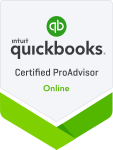Common Bookkeeping Mistakes to Avoid

Bookkeeping is a critical part of running a successful business, but it’s easy to make mistakes that can lead to financial issues down the road. By understanding and avoiding common bookkeeping errors, you can maintain accurate records, ensure compliance with tax laws, and make more informed business decisions. Here are ten common bookkeeping mistakes and tips on how to avoid them.
- Failing to Track All Expenses Missing out on tracking small or cash expenses can lead to inaccurate financial records. It’s important to record every business expense, no matter how minor it seems. Use accounting software or apps to capture receipts and log expenses in real-time to ensure nothing is overlooked.
- Not Reconciling Accounts Regularly Skipping monthly bank reconciliations can cause discrepancies between bank statements and books. Regular reconciliation helps identify and correct errors promptly, ensuring your financial records are accurate and up-to-date.
- Mixing Personal and Business Finances Combining personal and business expenses can complicate bookkeeping and tax filing. Maintain separate bank accounts and credit cards for your business to ensure clear and distinct financial records, which simplifies tax preparation and financial analysis.
- Neglecting Backup and Security Not regularly backing up financial data or using weak security measures can risk data loss and breaches. Implement a reliable backup solution and ensure sensitive financial information is protected with strong passwords and encryption.
- Misclassifying Expenses Incorrectly categorizing expenses can distort financial reports and affect tax calculations. Take the time to understand the appropriate categories for your expenses and use consistent labeling in your accounting software to maintain clarity and accuracy.
- Ignoring Accounts Receivable Failing to follow up on unpaid invoices can hurt cash flow and financial stability. Implement a system to monitor accounts receivable, send timely reminders, and follow up on overdue invoices to maintain a healthy cash flow.
- Not Keeping Receipts and Documentation Lacking proper documentation for expenses can cause issues during audits and when claiming deductions. Keep organized records of all receipts, invoices, and financial documents to support your bookkeeping entries and tax filings.
- Overlooking Tax Deadlines Missing tax filing and payment deadlines can result in penalties and interest charges. Mark important tax deadlines on your calendar and set reminders to ensure timely filing and payment, helping you avoid unnecessary fines.
- Failing to Plan for Taxes Not setting aside funds for tax payments can create financial strain when taxes are due. Estimate your tax obligations periodically and set aside funds in a dedicated account to ensure you’re prepared when tax season arrives.
- Underestimating the Importance of Professional Help DIY bookkeeping without adequate knowledge can lead to significant errors and missed opportunities. Consider consulting a professional bookkeeper or accountant to review your records, provide guidance, and ensure compliance with financial regulations.
By being aware of these common mistakes and taking proactive steps to avoid them, you can improve your bookkeeping practices and maintain a solid financial foundation for your business.







Recent Comments